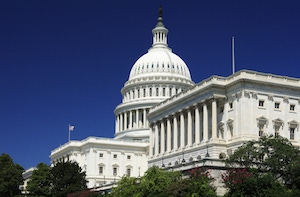Bill included in broader House energy legislation requires June 1 deadline for small refinery exemption applications.

In a vote Thursday, the House passed sweeping energy legislation in the Expanding Access to Sustainable Energy Act of 2019 (H.R. 4447), which includes the Renewable Fuel Standard (RFS) Integrity Act introduced by House Agriculture Committee chairman Collin Peterson (D., Minn.).
Since 2016, the Environmental Protection Agency has approved 85 small refinery exemptions (SREs), which effectively reduced demand for renewable fuels like corn-based ethanol and biodiesel by roughly 4 billion gal.
Currently, refiners have no clear deadline from EPA for submitting a request for SREs. The bipartisan RFS Integrity Act explicitly sets the deadline for refineries to submit an application for an SRE by June 1 in the year prior to the year in which the biofuel targets go into effect. Additionally, the legislation increases transparency into the SRE application process, providing the public with greater insight into who is receiving these waivers and why.
Peterson introduced the bill with Reps. Dusty Johnson (R., S.D.), Dave Loebsack (D., Iowa), Rodney Davis (R., Ill.) and Roger Marshall (R., Kan.). It is designed to bring transparency to EPA’s SRE process and ensure that refiners meet biofuel blending requirements.
“The House passage of H.R. 4447 moves us closer to holding EPA accountable for its reckless use of small refinery waivers," Peterson said. "EPA has granted dozens of waivers in recent years and has refused to share details of their justification with Congress and the public. The waivers undermine the blending requirements required by law and harm rural communities that produce biofuels. The provisions of my bill will force EPA to publicly release details of these waiver petitions.”
“After years of EPA mismanagement, this legislation would finally give farmers and biofuel producers a long-overdue peek at EPA’s secretive and destructive process,” Growth Energy chief executive officer Emily Skor said. “EPA’s lack of transparency on refinery exemptions sends mixed signals to the market and leaves billions of gallons of demand at the mercy of regulatory whim. This long-overdue fix would begin to close the book on abuse and put rural America on a stable footing while we rebuild the agricultural supply chain. We’re grateful to chairman Peterson and his co-sponsors for their efforts to get this critical legislation through the House of Representatives and on to the Senate.”
The bill would also require public disclosure of the volumes of biofuels potentially affected by the petition, along with the name of the petitioner.
Kurt Kovarik, National Biodiesel Board vice president of federal affairs, stated, "This is a commonsense step to ensure that RFS biomass-based diesel volumes are fully met and to prevent a recurrence of the demand destruction for biodiesel that we've seen over the past several years. Biodiesel and renewable diesel producers have a right to know how many gallons of their product may be lost from RFS volumes when major refiners like Exxon ask for special treatment."
About the Author(s)
You May Also Like



.png?width=300&auto=webp&quality=80&disable=upscale)

